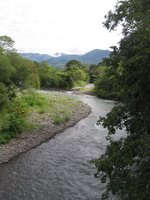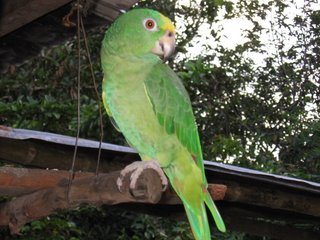


I've been pasear-ing to different places this past week. Being away more than usual has made it a little easier to bear with still living with a host family, even though I technically could move out any time now. If only there was a house ready to move into...
Wednesday I had the opportunity to go on a trip to the Comarca Ngöbe-Bugle. The comarcas are areas independently goverened by the indigenous tribes of Panama. The poverty level is greater in these areas, however the beauty is astounding. The Ngöbe and Bugle tribes were two independent tribes that combined to rule the area just north of the province of Chiriquì. I went with a group from the national environmental authority, ANAM, to observe and assist with a day-long training of new ANAM volunteers from the Comarca. The day was interesting and inspiring, meeting many people living in poor conditions, yet were motivated and excited about developing more environmentally sustainable ways to live. For example, traditional farming in Panama involves a lot of slash-and-burn agriculture methods, and in the Comarca the burning is relatively uncontrolled, sometimes spreading to virgin rainforests as well as polluting the air with thick smoke. The farmers of the Comarca Ngöbe-Bugle are interested in learning about other ways to farm, such as making organic fertilizer, and investing in reforestation projects.
A lot of work goes into a cup of coffee, as I found out on Friday I went to visit a friend's site to help with a small coffee harvest and roasting. Coffee is abundant in the mountains of Chiriquì, where some of the best coffee in the world is grown, some of which has been sold for over $50 a pound. My friend and I hiked around the gorgeous coffee fincas in a valley of Volcan Baru, many of which use sustainable shade-growing techniques, and some of which are organic certified. After the hike, we headed to tostar some green coffee beans. The beans are red when on the tree, and are first dried for about at week in the sun, and then de-shelled using either a traditional mortar and pestle method, or on a larger scale, taken to a coffee processing plant. We were roasting a small batch for a local family, so I worked to smash the dry beans, removing the husk but keeping the green beans whole. The husked were then separated completely from the beans by shaking the mixture on a flat board before picking away husk remnants. Finally, the beans were roasted in a large pan over an open flame for about two hours, being stirred constantly, until they were roasted an even, oily black. I drank a lot of very fresh coffee during that trip.
A couple nights ago my friend came to visit, and we spent a night patrolling the beach, looking for nesting sea turtles. The search was unsuccessful, but there will be other attempts! Today I'm heading to a Halloween party in Santiago, a town about half way to Panama City, before going to the city itslef for a few days. Maybe my house will be ready to move into when I return to my site this weekend!

